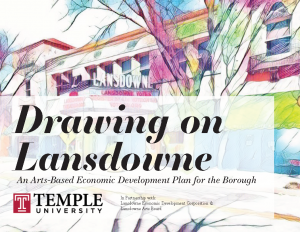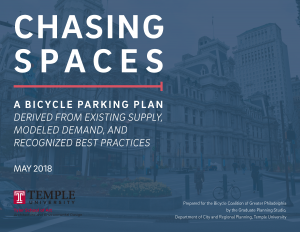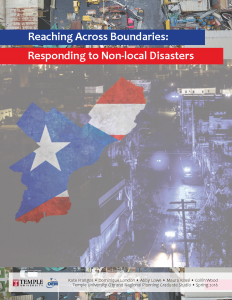2017 and 2018 Graduate Planning Studios
Three exceptional projects engaged our studio students in Spring 2017 and Spring 2018.
 The result of a 2-year collaboration between the Lansdowne Arts Board, the Lansdowne Economic Development Corporation, and Temple University led the creation of “Drawing on Lansdowne. An Arts-Based Economic Development Plan for the Borough“. Students in the 2017 studio researched best practices in creative placemaking, detailed existing conditions, and interviewed dozens of stakeholders. Students in the second year, 2018, completed the interviews, held focus groups, and authored the final plan document. This plan leverages Lansdowne’s existing cultural and creative assets, highlights creative placemaking strategies and best practices found to be successful in similar communities, and provides guiding principles for future planning efforts in arts-based development.
The result of a 2-year collaboration between the Lansdowne Arts Board, the Lansdowne Economic Development Corporation, and Temple University led the creation of “Drawing on Lansdowne. An Arts-Based Economic Development Plan for the Borough“. Students in the 2017 studio researched best practices in creative placemaking, detailed existing conditions, and interviewed dozens of stakeholders. Students in the second year, 2018, completed the interviews, held focus groups, and authored the final plan document. This plan leverages Lansdowne’s existing cultural and creative assets, highlights creative placemaking strategies and best practices found to be successful in similar communities, and provides guiding principles for future planning efforts in arts-based development.
 Philadelphia is known as a bicycle-friendly city, but anecdotal evidence suggested that its bicycle parking infrastructure was inadequate. Working with the Bicycle Coalition of Greater Philadelphia, students authored, “Chasing Space: A Bicycle Parking Plan“. The goal of this project is to understand where and how investments into bicycle parking should be prioritized within Center City, Philadelphia. The project is comprised of four primary phases: A policy-based assessment of bicycle parking in Philadelphia and elsewhere; A spatial analysis of bicycle parking in Philadelphia based on an inventory of existing infrastructure and utilization alongside a forecast demand model; A practical analysis based on a survey of bicyclists on their bicycle parking habits in Center City; and A series of recommendations informed by
Philadelphia is known as a bicycle-friendly city, but anecdotal evidence suggested that its bicycle parking infrastructure was inadequate. Working with the Bicycle Coalition of Greater Philadelphia, students authored, “Chasing Space: A Bicycle Parking Plan“. The goal of this project is to understand where and how investments into bicycle parking should be prioritized within Center City, Philadelphia. The project is comprised of four primary phases: A policy-based assessment of bicycle parking in Philadelphia and elsewhere; A spatial analysis of bicycle parking in Philadelphia based on an inventory of existing infrastructure and utilization alongside a forecast demand model; A practical analysis based on a survey of bicyclists on their bicycle parking habits in Center City; and A series of recommendations informed by
the findings of the preceding analyses.
 On October 11, 2017, the Philadelphia Office of Emergency Management (OEM) opened the Disaster Assistance Service Center (DASC) in response to the arrival of Puerto Ricans displaced by the effects of Hurricane Maria. The center connected 2,003 individuals from Puerto Rico with the Federal Emergency Management Administration(FEMA), Pennsylvania Emergency Management Administration (PEMA), the Small Business Administration (SBA), and a variety of health and human services through the close of business on December 22nd, 2017. Knowing that such self-evacuations of storm survivors will likely happen again, OEM asked Temple University to conduct an assessment of their response, and to make recommendations as to best practices they should adopt moving forward. The report, “Reaching Across Boundaries: Responding to Non-local Disasters” made several key recommendations for future operations by OEM: (a) acquisition of Host-State Status; (b) development of a temporary housing placement strategy; (c) formalization of staffing plans for future DASC activations; and (d) developing a potential DASC location inventory
On October 11, 2017, the Philadelphia Office of Emergency Management (OEM) opened the Disaster Assistance Service Center (DASC) in response to the arrival of Puerto Ricans displaced by the effects of Hurricane Maria. The center connected 2,003 individuals from Puerto Rico with the Federal Emergency Management Administration(FEMA), Pennsylvania Emergency Management Administration (PEMA), the Small Business Administration (SBA), and a variety of health and human services through the close of business on December 22nd, 2017. Knowing that such self-evacuations of storm survivors will likely happen again, OEM asked Temple University to conduct an assessment of their response, and to make recommendations as to best practices they should adopt moving forward. The report, “Reaching Across Boundaries: Responding to Non-local Disasters” made several key recommendations for future operations by OEM: (a) acquisition of Host-State Status; (b) development of a temporary housing placement strategy; (c) formalization of staffing plans for future DASC activations; and (d) developing a potential DASC location inventory